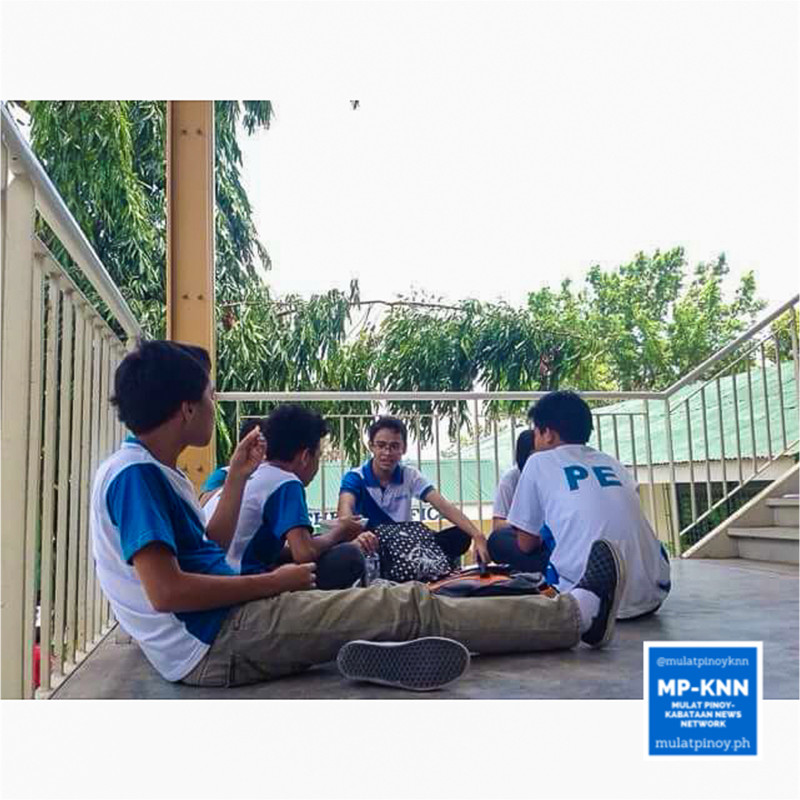I was three when I first exerted effort to map out my future. I wanted so badly to be a teacher. My parents, being both educators, were not surprised. Fifteen years later — much to their surprise — I already am one.
I was surprised, too. It was not by my being what I dreamed to be, but by the difference of the job I once thought I very well knew. It seemed to me that teaching greeted me with open arms and a grin while saying, “Welcome to the New Age!”
After years in the classroom both as a student and a mentor, I understand very well that there is a lot more to teaching and being a teacher than what we believe. These nuggets of truth, I deem, are essential things every 21st century teacher should know.

“The best way to start talking is to listen.” | Photo by Luigie Hadap/MP-KNN
Students crave companionship
From the ruffian to the geek to the holier-than-thou, students seek somebody they can relate to and can identify themselves with. It is therefore helpful to consider going the extra mile when imparting lessons to them. Instead of simply tossing facts here and there, try to take the journey of learning with them by fostering an interactive atmosphere of mystery and discovery.
You shouldn’t always give them what they crave
Planning to go the extra mile? Pause to think and make sure you do not get yourself unnecessarily caught in your student’s personal life. Not all lessons should be taught by academe educators.
This is very important for beginning teachers, especially those who are fresh graduates or are just a few years older than their students. Maintain an invisible wall that demarcates professionalism from friendship. Do not hang out with them too often after class hours. Joking that involves personal lives and are outside classes should also be sparse. It benefits both sides: you garner respect from them, and they know their teacher doesn’t foster favoritism or bias, and is therefore trustworthy.
Give yourself the benefit of surprises
The little distance you purposefully leave between your personal affairs and your students’ is actually an endless space for your utility. Break their expectations by giving them something more than they look forward to, especially in lessons.
Instead of writing a whole story, why not let each student have his or her turn writing one paragraph using the previous paragraph as a guide? Incorporate debates, dramas, and even real-life advice in literature. Go hunting for hidden objects in school using a treasure map filled with math equations to solve. Combine one or two subjects into one blast of a lesson–the options are limitless. This way, you build your own image and spark their interest to come to school tomorrow.
Education is always about the student
Being an educator requires having oversight, and it is easy and often tempting to overlook actual growth to oversee the grading. However, it should go the other way around: overlook the numbers for a while to oversee their growth to maturity firsthand. Having a good look at their performance can make gauging and grading easier. Plus, grades only matter until their next graduation; their acquired values and self-esteem stay with them for the rest of their lives.

“Overlook the numbers for a while to oversee their growth to maturity firsthand; their acquired values and self-esteem stay with them for the rest of their lives.” | Photo by Luigie Hadap/MP-KNN
The best way to start talking is to listen
Young people’s heads are bursting with stories—both factual and fantastic—of adventure, humor, drama and suspense. It is sometimes good to have them pour out their thoughts and ideas before the start of lectures. That way, they feel heard and can return the favor by listening to you. More than that, sometimes their stories hold nuggets of gold worth keeping.
Students grow to maturity as babies do
Sure, there are some who don’t seem to need supervision, but in general students are very much like babies. They need equal parts of supervision and freedom. They need to be showered with praises and admonished with love until they become capable of understanding words with more impact. They need to learn how to speak, and understand why they should listen.
It’s not always about filling their shoes
More than 80 percent of the time, a teacher should understand and consider the student because that is the nature of education. The unrecognized 20 percent, however, is the part where students must understand what teachers do and what teachers value. Of all the things, this might be the most difficult to achieve, let alone begin, as it requires a certain level of maturity on both sides.
Students are innately curious about understanding what they think is hidden from them. By being true to the values you teach and by exerting a little more effort, like writing comments on their output, you can raise their interest in pleasing you, and thus in understanding you. Giving them positive and encouraging glimpses of being a teacher can also do the trick.
Why bother? Because the prize is unequivocal harmony in the classroom, and a certainty that you will live on through your students.
This is but a meager list of a gazillion things an educator by profession and by heart should bear in his or her soul. The complete list is exhaustive and encompasses life, and yet the very thing I was looking forward to when I was three.